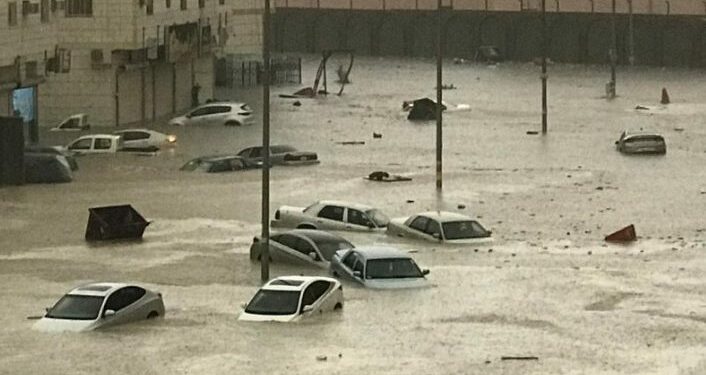Popular criticism… Pilgrims path flooded with rain water

Saudis expressed their anger on social media sits after activists circulated videos showing what they described as “catastrophic scenes” in the city of Taif, where its streets and neighborhoods were flooded with rain waters that ranged from medium to heavy.
Saudi tweeters mentioned the corruption of officials and state institutions, demanding planning restructuring by European companies that would restore Taif to its prestige and beauty.
Some asked about the absence of drainage for the rain water that led to the drowning of a large number of cars.
Other tweeters sent a letter to the Governor of Taif, Saad al-Maimouni, accusing him of failing to do his duties regarding the city.
A member of the Arab Union for Astronomy and Space Sciences, Khaled Al-Zzaa’q, previously said that the rains in the Kingdom’s regions are normal, but poor the infrastructure has made the natural matter a catastrophe.
The former consultant in strategic planning at Saudi Aramco, Bargas Al-Bargas, commented on the failure of infrastructure to cope with the rain due to two reasons: project corruption and the absence of “engineering and project management”.
He said that one of the biggest problems in the projects is that the project is given to the contractor by recommendation in many cases, and this affects the contractor’s interest and is a major factor in its failure.
Al-Barjas pointed out that the volume of projects that Saudi Oger and Bin Laden companies are working on exceeds three hundred and fifty billion riyals ($93 billion), and this monopoly, Barges adds, pushes the two companies to miss projects for the sub-companies, while sharing profits at the expense of quality and stages of implementation.
Al-Barjas said that the second reason is no less important than corruption, explaining that government projects depend on the consulting company to manage the project and “which is failing and colluding with the contractor”, and he described the consulting firms as a “focus of corruption”.
Al-Barjas criticized the lack of a ministry of engineering and project management, although the value of the country’s development projects is estimated at two trillion riyals (533 billion dollars) in five years, especially since between 10% to 15% of the value of these projects is paid for engineering companies.





